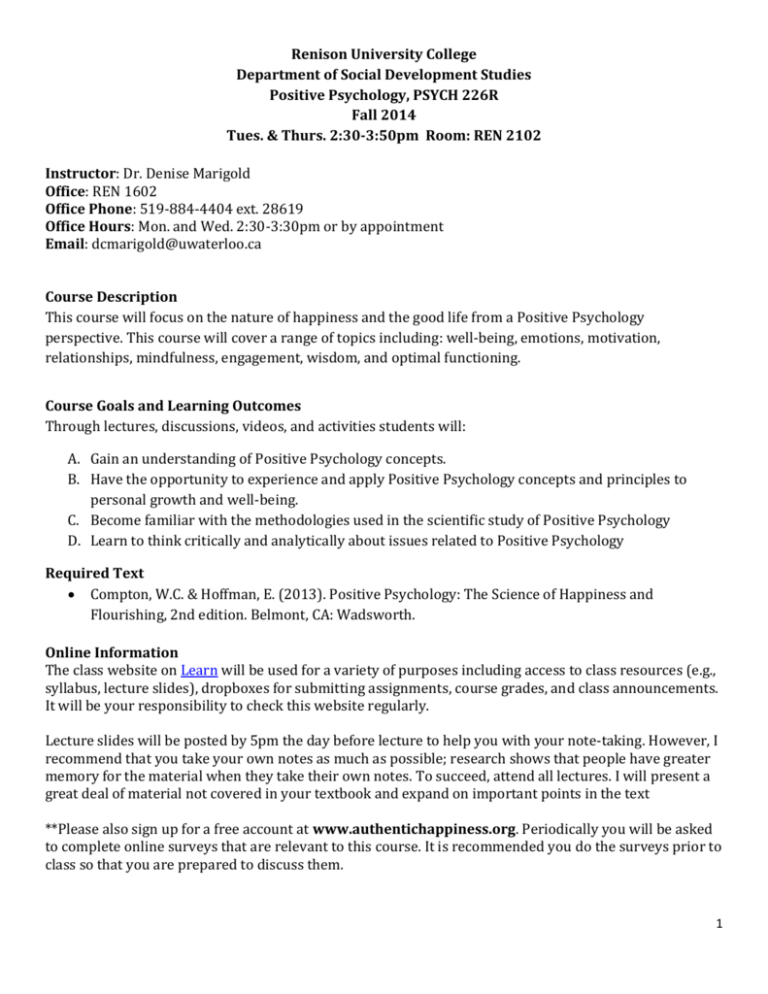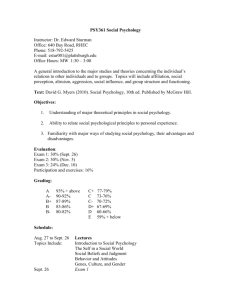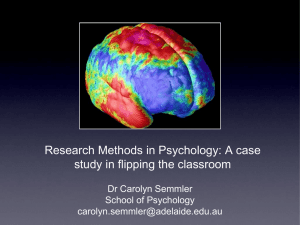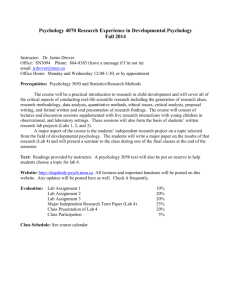psych 226r - University of Waterloo
advertisement

Renison University College Department of Social Development Studies Positive Psychology, PSYCH 226R Fall 2014 Tues. & Thurs. 2:30-3:50pm Room: REN 2102 Instructor: Dr. Denise Marigold Office: REN 1602 Office Phone: 519-884-4404 ext. 28619 Office Hours: Mon. and Wed. 2:30-3:30pm or by appointment Email: dcmarigold@uwaterloo.ca Course Description This course will focus on the nature of happiness and the good life from a Positive Psychology perspective. This course will cover a range of topics including: well-being, emotions, motivation, relationships, mindfulness, engagement, wisdom, and optimal functioning. Course Goals and Learning Outcomes Through lectures, discussions, videos, and activities students will: A. Gain an understanding of Positive Psychology concepts. B. Have the opportunity to experience and apply Positive Psychology concepts and principles to personal growth and well-being. C. Become familiar with the methodologies used in the scientific study of Positive Psychology D. Learn to think critically and analytically about issues related to Positive Psychology Required Text Compton, W.C. & Hoffman, E. (2013). Positive Psychology: The Science of Happiness and Flourishing, 2nd edition. Belmont, CA: Wadsworth. Online Information The class website on Learn will be used for a variety of purposes including access to class resources (e.g., syllabus, lecture slides), dropboxes for submitting assignments, course grades, and class announcements. It will be your responsibility to check this website regularly. Lecture slides will be posted by 5pm the day before lecture to help you with your note-taking. However, I recommend that you take your own notes as much as possible; research shows that people have greater memory for the material when they take their own notes. To succeed, attend all lectures. I will present a great deal of material not covered in your textbook and expand on important points in the text **Please also sign up for a free account at www.authentichappiness.org. Periodically you will be asked to complete online surveys that are relevant to this course. It is recommended you do the surveys prior to class so that you are prepared to discuss them. 1 Course Requirements and Assessment Assessment Test 1 Test 2 Test 3 Journals Reflection Paper Research Participation Total Date of Evaluation October 2 October 30 November 27 October 13 & November 17 December 4 November 27 Weighting 23% 23% 23% 10% 21% 2% bonus 100% + 2% Tests There will be 3 term tests that are non-cumulative. Test 1 will be based Lectures 1-7 and Chapters 1-4. Test 2 will be based on Lectures 8-14 and Chapters 5-8. Test 3 will be based on Lectures 15-21 and Chapters 9-12. Each test will have 35 multiple choice questions and 3 short answer questions. You will have up to 80 minutes to complete these tests. Journals Each week you will choose one of two or three reflective activities to complete. These might include keeping a gratitude journal, practicing mindfulness meditation, or interviewing an elderly relative who you believe possesses wisdom. These exercises are designed to help you apply Positive Psychology constructs to your own life, self-reflect in a meaningful way, and gain insight into the mechanisms and processes of the good life. You will write about your experience and reflect on any insights you gained. You may wish to include pictures, videos, poetry, music, or web links that demonstrate your experience with the topic. You can do these in a Word or PDF document, or in blog form (instructions provided on Learn). Two times during the term you will submit your journals me so that I can check them for completion. Submissions must be received by midnight on the due dates. Each submission will cover five weeks’ worth of activities. I will evaluate them based on a pass/fail criteria; that is, you will receive 1% for each of the 10 activities as long as you have made a reasonable effort to complete it. Dates for submission: Monday October 13 (weeks 1-5) and Monday November 17 (weeks 6-10) Reflection Paper For the final paper you will choose one of the topics covered in the course. You will need to find at least 3 scholarly journal articles on the topic, review the scientific evidence, integrate it with your personal experience, and make suggestions for future research. The paper should be no more than 5 pages doublespaced. More details will be posted on Learn. Date for submission: Thursday December 4 Research Participation Since experiential learning is a highly valued component of psychology, you can earn up to 2% in bonus marks for participating in psychology experiments relating to social, personality, and clinical psychology. If you do not wish to participate in research, as an alternative you may submit short reviews (1 to 2 pages) of Positive Psychology journal articles. Each review counts as one percentage point. You should email me your chosen article to get approval before writing the review. These reviews are due the last day of lectures (November 27). More information on both forms of extra credit is included at the end of this syllabus. 2 Schedule Date Sept. 9 Week 1 Sept. 11 Sept. 16 2 Sept. 18 Sept. 23 3 Sept. 25 Sept. 30 4 Lecture 1 Topic Introduction to Positive Psychology Reading Chapter 1 2 Strengths and Emotions Chapter 2: pg 23-33 3 Motivation Chapter 2: pg 33-42 4 5 The Nature and Measurement of Well-Being Subjective Well-Being Chapter 2: pg 42-48 Chapter 3: pg 51-54 Chapter 3: pg 54-76 6 Leisure, Flow, and Peak Performance Chapter 4: pg 79-90, 94-99 7 Mindfulness and Meditation Chapter 4: pg 90-94 Chapter 6: pg 143-144 Oct. 2 Oct. 7 Test 1 5 Oct. 9 Oct. 14 6 Oct. 16 Oct. 21 7 Oct. 23 Oct. 28 8 8 Love and Marriage Chapter 5: 101-108 9 Relationship Satisfaction Chapter 5: 108-125 10 Health and Wellness Chapter 6: 127-137 11 Coping and Longevity Chapter 6: 137-142, 145-149 12 Excellence and Aesthetics Chapter 7: pg 153-163 13 Creativity and Genius Chapter 7: pg 164-174 14 Well-Being Across the Lifespan Chapter 8: pg 177-195 Oct. 30 Nov. 4 Test 2 9 Nov. 6 Nov. 11 10 Nov. 13 Nov. 18 11 Nov. 20 Nov. 25 Nov. 27 12 15 Wisdom and Authenticity 16 Optimal Personality 17 Religion and Spirituality Chapter 9: pg 199-206, 209214 Chapter 9: pg 206-209, 214226 Chapter 10: pg 229-241 18 Religion and Spirituality Chapter 10: pg 241-257 19 Work and Engagement Chapter 11: pg 259-269 20 Communities and Culture Chapter 11: pg 269-280 21 The Future of Positive Psychology Chapter 12: pg 283-295 Test 3 3 Late Work You are responsible for informing the instructor in advance if you are unable to complete an assignment or test by the scheduled date. Missed due dates are only acceptable in the case of medical problems (with a medical note) and for serious compassionate reasons. Difficulty with assignments is not a sufficient reason for an extension. Any student who finds himself/herself struggling with an assignment during the term is encouraged to meet with me as soon as possible to discuss strategies for success. It is important to begin assignments well in advance of the due date in case of problems. Information on Plagiarism Detection Plagiarism detection software (Turnitin) will be used to screen assignments in this course. This is being done to verify that use of all material and sources in assignments is documented. In the first week of the term, details will be provided about the arrangements for the use of Turnitin in this course. Electronic Device Policy Ringing cell phones are a disruption during lecture, as is leaving the room to accept a cell phone call during class (even if the ringer is off). Cell phones must be turned off during lectures. Accommodation for Illness or Unforeseen Circumstances: The instructor follows the practices of the University of Waterloo in accommodating students who have documented reasons for missing quizzes or exams. You can read the policy here. If you miss a test, there will be no make-up. Instead, the weight of the missed test will be spread across the other two tests. Academic Intergrity Academic Integrity: In order to maintain a culture of academic integrity, members of the University of Waterloo are expected to promote honesty, trust, fairness, respect and responsibility. Discipline: A student is expected to know what constitutes academic integrity, to avoid committing academic offences, and to take responsibility for his/her actions. A student who is unsure whether an action constitutes an offence, or who needs help in learning how to avoid offences (e.g., plagiarism, cheating) or about “rules” for group work/collaboration should seek guidance from the course professor, academic advisor, or the Undergraduate Associate Dean. When misconduct has been found to have occurred, disciplinary penalties will be imposed under Policy 71 – Student Discipline. For information on categories of offenses and types of penalties, students should refer to Policy 71 - Student Discipline, http://uwaterloo.ca/secretariat/policies-procedures-guidelines/policy-71. Grievance: A student who believes that a decision affecting some aspect of his/her university life has been unfair or unreasonable may have grounds for initiating a grievance. Read Policy 70 - Student Petitions and Grievances, Section 4, http://uwaterloo.ca/secretariat/policies-proceduresguidelines/policy-70. In addition, consult http://arts.uwaterloo.ca/student-grievances-faculty-artsprocesses for the Faculty of Arts’ grievance processes. Appeals: A student may appeal the finding and/or penalty in a decision made under Policy 70 Student Petitions and Grievances (other than regarding a petition) or Policy 71 - Student Discipline if a ground for an appeal can be established. Read Policy 72 - Student Appeals, http://uwaterloo.ca/secretariat/policies-procedures-guidelines/policy-72. Academic Integrity website (Arts): http://arts.uwaterloo.ca/arts/ugrad/academic_responsibility.html Academic Integrity Office (uWaterloo): http://uwaterloo.ca/academic-integrity/ 4 Accommodation for Students with Disabilities: Note for students with disabilities: The AccessAbility Services (AS) Office, located in Needles Hall, Room 1132, collaborates with all academic departments to arrange appropriate accommodations for students with disabilities without compromising the academic integrity of the curriculum. If you require academic accommodations to lessen the impact of your disability, please register with the AS Office at the beginning of each academic term. Cross-listed course: Please note that a cross-listed course will count in all respective averages no matter under which rubric it has been taken. For example, a PHIL/PSCI cross-list will count in a Philosophy major average, even if the course was taken under the Political Science rubric. A respectful living and learning environment for all. 1. It is expected that everyone living, learning or working on the premises of Renison University College will contribute to an environment of tolerance and respect by treating others with sensitivity and civility. 2. Harassment is unwanted attention in the form of jokes, insults, gestures, gossip, or other behaviours that are meant to intimidate. Some instances of harassment are against the law in addition to Renison University College policy. 3. Discrimination is treating people differently because of their race, disability, sex, sexual orientation, ancestry, colour, age, creed, marital status, or other personal characteristics. The Ontario Human Rights Code considers actions and behaviours rather than intentions. 4. If you experience or witness either harassment or discrimination, you may contact the Renison University College Harassment and Discrimination Officer at mmalton@uwaterloo.ca (519-884-4404, ext. 28628). 5 Research Experience Marks Information and Guidelines Experiential learning is considered an integral part of the undergraduate program in Psychology. Research participation is one example of this, article review is another. A number of undergraduate courses have been expanded to include opportunities for Psychology students to earn grades while gaining research experience. Since experiential learning is highly valued in the Department of Psychology, students may earn a "bonus" grade of up to 2% in this course through research experience. Course work will make up 100% of the final mark and a "bonus" of up to 2% may be earned and will be added to the final grade if/as needed to bring your final grade up to 100%. The two options for earning research experience grades (participation in research and article review) are described below. Students may complete any combination of these options to earn research experience grades. Option 1: Participation in Psychology Research Research participation is coordinated by the Research Experiences Group (REG). Psychology students may volunteer as research participants in lab and/or online (web-based) studies conducted by students and faculty in the Department of Psychology. Participation enables students to learn first-hand about psychology research and related concepts. Many students report that participation in research is both an educational and interesting experience. Please be assured that all Psychology studies have undergone prior ethics review and clearance through the Office of Research Ethics. Educational focus of participation in research To maximize the educational benefits of participating in research, students will receive feedback information following their participation in each study detailing the following elements: Purpose or objectives of the study Dependent and independent variables Expected results References for at least two related research articles Provisions to ensure confidentiality of data Contact information of the researcher should the student have further questions about the study Contact information for the Director of the Office of Research Ethics should the student wish to learn more about the general ethical issues surrounding research with human participants, or specific questions or concerns about the study in which s/he participated. Participation in LAB studies is worth 0.5 participation credits (grade percentage points) for each 30-minutes of participation. Participation in ONLINE studies is worth .25 credits for each 156 minutes of participation. Researchers will record student’s participation and will advise the course instructor of the total credits earned by each student at the end of the term. How to participate? Study scheduling, participation and grade assignment is managed using the SONA online system. All students enrolled in this course have been set up with a SONA account. You must get started early in the term. INSTRUCTIONS/DATES/DEADLINES: How to log in to Sona and sign up for studies *** Please do not ask the Course Instructor or REG Coordinator for information unless you have first thoroughly read the information provided on this website.*** More information about the REG program is available at: REG Participants' Homepage Option 2: Article Review as an alternative to participation in research Students are not required to participate in research, and not all students wish to do so. As an alternative, students may opt to gain research experience by writing short reviews (1 to 2 pages) of research articles relevant to the course. The course instructor will specify a suitable source of articles for this course (i.e., scientific journals, newspapers, magazines, other printed media). You must contact your instructor to get approval for the article you have chosen before writing the review. Each review article counts as one percentage point. To receive credit, you must follow specific guidelines. The article review must: Be submitted before the last day of lectures. Late submissions will NOT be accepted under ANY circumstances. Be typed Fully identify the title, author(s), source and date of the article. A copy of the article must be attached. Identify the psychological concepts in the article and indicate the pages in the textbook that are applicable. Critically evaluate the application or treatment of those concepts in the article. If inappropriate or incorrect, identify the error and its implications for the validity of the article. You may find, for example, misleading headings, faulty research procedures, alternative explanations that are ignored, failures to distinguish factual findings from opinions, faulty statements of cause-effect relations, errors in reasoning, etc. Provide examples whenever possible. Clearly evaluate the application or treatment of those concepts in the article. Keep a copy of your review in the unlikely event we misplace the original. 7




